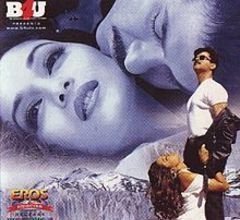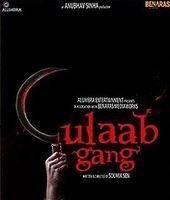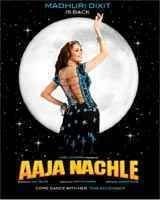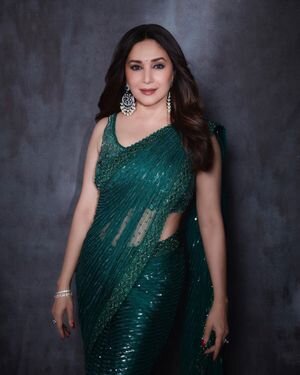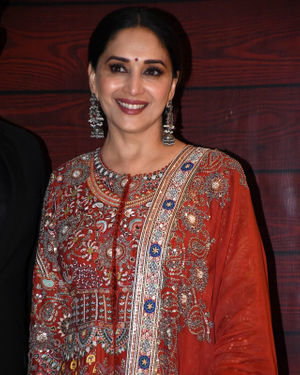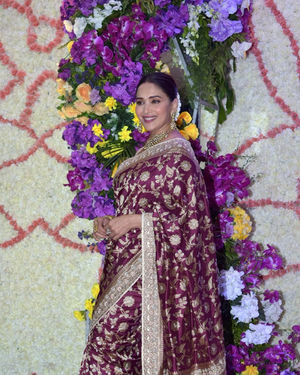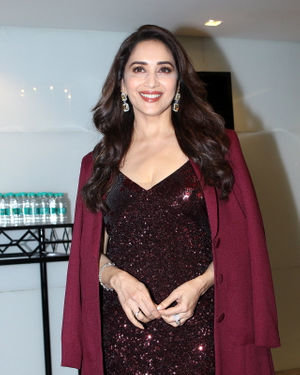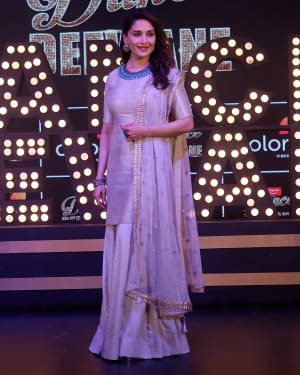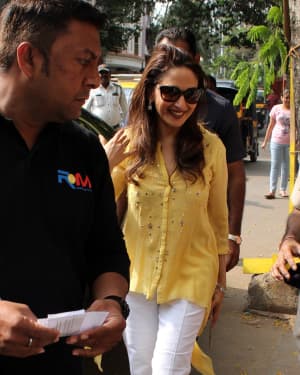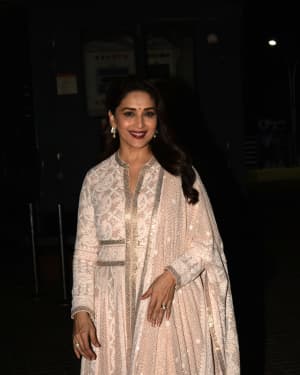Madhuri Dixit Wiki
Early life and background
Madhuri Dixit was born on 15 May 1967 into a Marathi Kokanastha Brahmin family in Bombay (present-day Mumbai) to Shankar and Snehlata Dixit. She has two elder sisters and an elder brother. She kindled an interest in dance at an early age of three, and went on to train in Kathak for eight years; later on becoming a professionally trained Kathak dancer.Dixit received her education at Divine Child High School in Andheri. Apart from her studies, she participated in extra-curricular activities, such as dramatics. Aspiring to become a microbiologist, Dixit enrolled at the Sathaye college in Vile Parle (Mumbai) where she studied microbiology as one of her subjects in BSc. However, six months after she had commenced her course, Dixit decided to discontinue studies and pursue a full-time career in films.Acting career
Dixit made her cinema debut in 1984 with Rajshri Productions' drama ''Abodh'', opposite Bengali actor, Tapas Paul. Upon release, the film failed commercially but Dixit's performance earned her positive reviews from critics. Aakash Barvalia of Gomolo wrote, "Madhuri excels in her role as a young bride who acquits herself well as the naive village girl and does not realise what marriage actually entails." Her only release of 1985 – ''Awara Baap'' – flopped at the box office. During this time, a monochrome photograph of hers, shot by Gautam Rajadhyaksha was featured on the cover of the then-popular magazine ''Debonair'' and she appeared as the cover girl of Filmfare in April 1986.Dixit's next four releases were the dramas ''Swati'' (1986), ''Manav Hatya'' (1986), ''Hifazat'' (1987) and ''Uttar Dakshin'' (1987). None of these films performed well either critically or commercially. Hifazat marked Dixit's first of several collaborations with Anil Kapoor. In 1988, Dixit had film releases; two of them —''Mohre'', and ''Khatron Ke Khiladi'' —were commercial failures.In 1988, Dixit acted in ''Dayavan'', which was a commercially successful film. In her next movie from the same year she finally attained recognition when she played Mohini, an impoverished and miserable woman, who is forced to dance to make money for her father in N. Chandra's action drama ''Tezaab'' opposite Anil Kapoor. It went on to become the highest-grossing film of the year and she received her first Filmfare Award for Best Actress nomination; the film's success established Dixit as a leading actress of Hindi cinema, and marked a significant turning point in her career. Akshay Shah of ''Planet Bollywood'' wrote, "Madhuri Dixit also gives a fine tuned performance. Though she is more remembered for her crowd pleasing dance act 'Ek Do Teen', her acting needs to be noted, specially in the scenes where she is pitted against Anupam Kher."Her first release of 1989, ''Vardi'', did fairly well at the box office. She next re-united with Anil Kapoor for Subhash Ghai's ''Ram Lakhan''. She played Radha Shastri, a girl who falls in love with her childhood friend, but finds it hard to convince her father. Finishing up as the second highest-grossing film of the year, ''Ram Lakhan'' emerged as a "super-hit" at the box office. Dixit's next release was the romantic drama ''Prem Pratigyaa'', in which she was paired opposite Mithun Chakraborty. Her portrayal of Laxmi Rao, a distraught woman who influences a local underworld don letting him give up his bad habits, earned her a second nomination for the Filmfare Award for Best Actress. Dixit collaborated with Trimurti Films for the action thriller ''Tridev'' which featured an ensemble cast (Sunny Deol, Naseeruddin Shah, Jackie Shroff, Sangeeta Bijlani, Sonam and Amrish Puri). It finished up as one of the biggest hits and the third highest-grossing film of the year.Her next release of the year, Vidhu Vinod Chopra's drama ''Parinda'', co-starring Anil Kapoor, Jackie Shroff and Nana Patekar was another box office hit. She played Paro, a schoolteacher who is killed on her wedding night along with Karan (played by Kapoor) by a gangster (played by Patekar). A major critical success, the film was included in News18's 2013 list of the "100 greatest Indian films of all time". It was selected as the official Indian submission for the 1990 Academy Award for Best Foreign Language Film but was not nominated. Rediff.com opined that Dixit added "touching vulnerability and soft focus appeal to the heavy duty proceedings". Also that year, after ''Prem Pratigyaa'' she starred in ''Ilaaka'', ''Mujrim'' (both opposite Mithun Chakraborty) and all three were hits. Other films such as ''Paap Ka Ant'' (opposite Govinda) and ''Kanoon Apna Apna'' (opposite Sanjay Dutt) was an average grosser.In 1990, Dixit appeared in nine films. Five of them—''Maha-Sangram'', ''Deewana Mujh Sa Nahin'', ''Jeevan Ek Sanghursh'', ''Sailaab'' and ''Jamai Raja''—were commercially unsuccessful. Her next release that year was Rakesh Roshan's action comedy ''Kishen Kanhaiya'' (alongside Anil Kapoor and Shilpa Shirodkar). It tells the story of twin brothers who are separated at birth and re-unite in their youth. Dixit and Shirodkar played the love interests of Kapoor's characters. It was the fourth-highest-grossing film of the year in India. Dixit next played a strong-willed woman in the box-office average action drama ''Izzatdaar''. She won her first Filmfare Award for Best Actress for portraying Madhu, a rich and arrogant girl who falls in love with a poorer boy, in Indra Kumar's romantic drama ''Dil'' opposite Aamir Khan. It emerged as the highest-grossing film of the year. Rediff.com hailed her performance, commenting "..she showed her range as a performer. She breathed fire as the rebellious lover defying her family, or the forlorn estranged wife longing to be with her ailing better half." Dixit's final release of the year was the action drama ''Thanedaar'', opposite Dutt, which was another commercial hit.In 1991, Dixit had five film releases, the first of which was the romance ''Pyar Ka Devta''. She next starred alongside Jackie Shroff in the psychological thriller ''100 Days''. She played Devi, a clairvoyant woman who has a vision of a murder and sets out to uncover the truth. The film was a moderately successful. She next starred in ''Saajan'' opposite Dutt and Salman Khan. A major critical and commercial success, the film earned Dixit praise for her portrayal of Pooja Saxena, who is in love with her idol – Sagar. She received her fourth Best Actress nomination at Filmfare for her work in the film. T. Rama Rao's ''Pratikar'' and Nana Patekar's ''Prahaar'' were her other releases.In 1992, Dixit starred in Sudhir Mishra's ''Dharavi'' starring Om Puri, Shabana Azmi and Anil Kapoor. T. Rama Rao's ''Pratikar'' and Nana Patekar's ''Prahaar'' were her other releases.In 1992, Dixit starred in Sudhir Mishra's ''Dharavi'' starring Om Puri, Shabana Azmi and Anil Kapoor. Dixit appears in the film as part of the lead character's (played by Puri) escapist dreams, portraying the fictional version of herself. The film was a joint NFDC-Doordarshan production and went on to win the National Film Award for Best Feature Film in Hindi. Dixit's next release of the year was Kumar's drama ''Beta'', co-starring Anil Kapoor and Aruna Irani. Dixit's portrayal of Saraswati, an educated woman who rebels against her manipulative mother-in-law, earned her critical acclaim. Sukanya Verma mentioned that Dixit delivered "a powerhouse performance against an equally lethal looking Irani, even as Kapoor was overshadowed between the ladies." The film finished up as the biggest hit of the year and won her a second Filmfare Award for Best Actress. Following the film's success, Dixit became famously known as the "Dhak Dhak Girl". ''Zindagi Ek Juaa'', ''Prem Deewane'', ''Khel'' and ''Sangeet'' were her other releases of the year.In 1993, Dixit appeared in Ramesh Talwar's ''Sahibaan'' which was commercially successful. Following the film's success, Dixit became famously known as the "Dhak Dhak Girl". ''Zindagi Ek Juaa'', ''Prem Deewane'', ''Khel'' and ''Sangeet'' were her other releases of the year.In 1993, Dixit appeared in Ramesh Talwar's ''Sahibaan'' which was commercially successful. Dixit next reunited with Sanjay Dutt and Jackie Shroff in Subhash Ghai's crime drama ''Khalnayak''. Her portrayal of Ganga, a police officer, who volunteers to go undercover, to trap an escaped criminal, garnered her critical acclaim. ''India Today'' wrote, "..she grinds and thrusts in her trademark dhak dhak style. The whistles grow deafening when she stares into the camera, looks at every man in the dark, and promises him her heart-and much more. In one Bangalore theatre, the police were kept on stand-by in case the crowds went berserk." Dixit's performance in ''Khalnayak'' earned her a sixth nomination for the Filmfare Award for Best Actress and became the second highest-grossing film of the year in India. Singeetam Srinivasa Rao's ''Phool'' and Lawrence D'Souza's ''Dil Tera Aashiq'' were her other releases of the year.In 1994, Dixit starred in Rahul Rawail's psychological thriller ''Anjaam'', which marked her first of many collaborations with Shah Rukh Khan. Dixit's portrayal of Shivani Chopra, a revenge-seeking wife and mother earned her a seventh nomination for the Filmfare Award for Best Actress. The film performed moderately well at the box office. Singeetam Srinivasa Rao's ''Phool'' and Lawrence D'Souza's ''Dil Tera Aashiq'' were her other releases of the year.In 1994, Dixit starred in Rahul Rawail's psychological thriller ''Anjaam'', which marked her first of many collaborations with Shah Rukh Khan. Dixit's portrayal of Shivani Chopra, a revenge-seeking wife and mother earned her a seventh nomination for the Filmfare Award for Best Actress. The film performed moderately well at the box office. Her next release was Rajshri Productions' family drama ''Hum Aapke Hain Koun..!'' opposite Salman Khan. The film emerged as one of the biggest hits in the history of Hindi cinema and made 1.35 billion worldwide, breaking the record of the film ''Sholay'' (1975). It became the highest grossing Bollywood film in Hindi cinema history after its theatrical run and held the record for 7 years till the release of ''Gadar: Ek Prem Katha'' (2001). Dixit's portrayal of Nisha, who falls in love with Prem (Khan's character) but their plans to be together are put in jeopardy when Nisha's sister dies, fetched her a third Filmfare Award for Best Actress and her first Screen Award for Best Actress. Critics believed the film to be "too sweet" but appreciated Dixit's performance. Tripat Narayanan of ''New Straits Times'' wrote "The Madhuri magic looms large throughout the film. As she emotes through dance, you simply cannot take your eyes off her." In a retrospect review, ''Rediff'' wrote, "Madhuri's Nisha was stunning, enthused, plucky and irresistible." Film critic K Hariharan noted, "She is seducing every person on screen, but does it in ways that are so graceful, there is a good balance between profanity and the sacred." The film won two National Film Awards, including the Best Popular Film Providing Wholesome Entertainment and in the Millennium Edition of the "Guinness Book of World Records", ''Hum Aapke Hain Koun'' became Bollywood's highest-grossing film.Dixit achieved further success when she reunited with Indra Kumar for the romantic drama ''Raja'' opposite Sanjay Kapoor. She portrayed Madhu, a rich girl who falls for her childhood friend (played by Kapoor), however, she finds it tough to convince her two brothers of this relationship. It emerged as the third highest-grossing film of the year and its success was attributed to Dixit's immense popularity. She won a second Screen Award for Best Actress for her performance. Her next release was David Dhawan's ''Yaraana'' opposite Rishi Kapoor, in which she played Lalita, a dancer on the run from her abusive lover. The film underperformed at the box office. Both the films earned her nominations for the Filmfare Award for Best Actress.The following year, both her films ''Prem Granth'' and ''Rajkumar'' flopped at the box office. In 1997, Dixit received critical acclaim for her portrayal of Ketki Singh, a village woman who struggles to confront and defeat the forces of oppression and male domination in Prakash Jha's ''Mrityudand'' alongside Shabana Azmi and Shilpa Shirodkar. In a review for India Today, Anupama Chopra wrote, " Dixit gives her career's best performance. Simply dressed, she looks stunning and acts even better. She is by turns romantic, vulnerable, angry – the perfect foil to Azmi's long-suffering 'badi bahu'." ''Screen'' magazine deemed her portrayal "fiery" and appreciated the lack of glamour in the part. For her performance, Dixit won a third Screen Award for Best Actress. She next starred in the dramas ''Koyla'', ''Mahaanta'' and ''Mohabbat''. With the exception of Koyla, none of these films performed well either critically or commercially.Dixit's fifth and final release of 1997 was Yash Chopra's musical romantic drama ''Dil To Pagal Hai''. Co-starring Shah Rukh Khan, Karisma Kapoor and Akshay Kumar, the film depicts the love stories of the dancers in a musical dance troupe. Her role of Pooja, a woman faced with a moral dilemma in a love quadrangle fetched her a fourth Filmfare Award for Best Actress and the Zee Cine Award for Best Actor – Female. ''Dil To Pagal Hai'' emerged as a blockbuster at the box office and emerged as the highest-grossing film of the year in India. At the 45th National Film Awards, the film won three awards, including the Best Popular Film Providing Wholesome Entertainment.She next starred in the N.Chandra-directed drama ''Wajood'' (1998) opposite Nana Patekar and Mukul Dev. She played Apoorva, a very rich girl who is misunderstood by Malhar, played by Patekar. Suparn Verma of ''Rediff'' commented: "..She nevertheless shows that even a weak role cannot stifle her as she animates the screen like only she can. Truly, the coming together of Nana, Madhuri and Chandra in one film is a tour de force." The same year, she appeared in a cameo role in the comedy ''Bade Miyan Chote Miyan'', once again playing herself onscreen after ''Dharavi''. Her next and only release of 1999 was the romance ''Aarzoo'' (1999) opposite Akshay Kumar and Saif Ali Khan. Upon release, the film emerged commercially unsuccessful.In 2000, Dixit starred in Rajkumar Santoshi's ''Pukar'' opposite Anil Kapoor. A love story based on the backdrop of the Indian Army, the film was shot over a course of 350 days. Dixit's portrayal of Anjali, a heartbroken and jealous woman who swears revenge on Jai (played by Kapoor) for rejecting her, garnered her several Best Actress nominations at various award ceremonies, including Filmfare and Screen. A review in ''Filmfare'' said that both "Anil Kapoor and Madhuri, veterans in their field, outdo themselves in the film". It won two National Film Awards, including the Nargis Dutt Award for Best Feature Film on National Integration. She then played the title character in ''Gaja Gamini'', the first feature film directed by painter M. F. Husain. Hussain got fixated with Dixit, and watched her movie ''Hum Aapke Hain Koun..!'' several times, and was certain that he would make a film only with her. The film followed the story of Gaja Gamini, who appears in various incarnations as Mona Lisa, Shakuntala and others. ''Pukar'' was an average grosser, while the latter underperformed at the box office. Critic Gautam Buragohain, however, described her as "the saving grace of the film", adding that "she gives a delightful performance". Commercially too, the film failed to do well. Subsequently, Dixit reunited with Rajkumar Santoshi for the social drama ''Lajja'' (2001). Dealing with the issue of gender inequality, Dixit played Janki, a theatre actress who gets pre-maritally pregnant. Anita Bora of Rediff.com wrote: "Madhuri slips into her role as Janaki..with consummate ease..and..dazzles us with a class act." The film was a box-office failure in India but was an overseas success. Dixit's performance fetched her a Filmfare Award for Best Supporting Actress nomination and won her the Zee Cine Award for Best Actor in a Supporting Role – Female. Dixit's first release of 2002 was the love triangle ''Hum Tumhare Hain Sanam'' opposite Shah Rukh Khan and Salman Khan, where she played Radha whose married life blemishes when she gets obsessed with the career of her friend. A remake of director K. S. Adhiyaman's own Tamil film ''Thotta Chinungi'' (1995), the film took six years in making, with huge sabbaticals in between shoots due to several production problems. The film emerged moderately successful at the Indian box office. Few critics noted that the delay made the film look outdated.Dixit's next release was Sanjay Leela Bhansali's period romantic drama ''Devdas'', co-starring Shah Rukh Khan and Aishwarya Rai. It was based on Sharat Chandra Chattopadhyay's novel of the same name. She portrayed Chandramukhi, a courtesan who is in love with the title character. Sita Menon of Rediff.com wrote: "The most understated role and perhaps the one that is most lingering, in terms of virtuosity, is that played by Madhuri Dixit. As Chandramukhi, she is simply stunning, lending passion, fire and gentleness with such consummate ease that watching her perform is sheer delight." The film was screened at the 2002 Cannes Film Festival and was featured by ''Time'' in their listing of the "10 Best Films of the Millennium". The film emerged as a major commercial success with revenues of over . ''Devdas'' was chosen as India's official entry for the Academy Award for Best Foreign Language Film and received a nomination for the BAFTA Award for Best Film Not in the English Language. At the 50th National Film Awards, the film won five awards, including the Best Popular Film Providing Wholesome Entertainment. Dixit eventually won the Filmfare Award for Best Supporting Actress and the Screen Award for Best Supporting Actress for her performance in the film. She played Dia, a choreographer who returns to her town to save the endangered theatre where she learnt to dance. A box office failure, the film generated positive reviews for Dixit's portrayal. Rajeev Masand of ''CNN-IBN'' criticised the plot, while he wrote about Dixit's performance: "It's hard to take your eyes off the screen when she's up there, dazzling you with her spontaneity, her easy charm and her 100-watt smile." Her performance earned her another nomination for the Filmfare Award for Best Actress.Dixit relocated to India with her family in 2011 and was felicitated by Filmfare with a special jury recognition for completing 25 years in the Indian film industry. In 2013, Dixit made a special appearance in the romantic comedy-drama ''Yeh Jawaani Hai Deewani'' as Mohini, a callback to her character from the 1988 film ''Tezaab''. Dixti appeared in the item song "Ghagra" alongside Ranbir Kapoor.In 2014, Dixit first starred in the black comedy ''Dedh Ishqiya'', a sequel to the 2010 film ''Ishqiya'' She played a con-woman, Begum Para, opposite Naseeruddin Shah, Arshad Warsi and Huma Qureshi and expressed that she agreed to do the film because of the "unapologetic way" director Abhishek Chaubey presented Vidya Balan's character in ''Ishqiya''. The film opened to positive response from critics who called it "one of the year's most important releases". Anupama Chopra called Dixit "compelling", while Deepanjana Pal of Firstpost wrote "She's still capable of keeping an audience glued to their seats when the credits start rolling, all because she's dancing on screen.". The film earned Dixit her fourteenth nomination for the Filmfare Award for Best Actress. ''Dedh Ishqiya'' earned little at the box-office.Her next release of the year was debutant director Soumik Sen's ''Gulaab Gang'', alongside Juhi Chawla. Dixit portrayed Rajjo, the leader of a women's activist group, inspired by the real vigilante activist Sampat Pal Devi and her group Gulabi Gang. Pal filed a case against the film claiming that the makers did not take permission to make a film on her life, but the court later lifted the stay from the film. To prepare for her role, Dixit practised Shaolin Kung fu, stick training, and close combat. ''Gulaab Gang'' failed at the box office, earning mixed reviews. Subhash K. Jha labelled Dixit's performance and demeanour "inconsistent". However, Sampat Pal claimed that in Dixit's character she finds a "reflection of her own life so stark" that it makes her feel "it was she on screen". The film was a box-office failure.Four years later, Dixit made her debut in Marathi Cinema with the comedy drama ''Bucket List''. She played Madhura Sane, a middle aged housewife who takes the initiative to complete the bucket list of her deceased teenage heart donor. Dixit garnered critical acclaim for her portrayal; Mihir Bhanage of The Times of Indiawrote "Madhuri owns the film and sails through it with flying colours."Four years later, Dixit made her debut in Marathi Cinema with the comedy drama ''Bucket List''. She played Madhura Sane, a middle aged housewife who takes the initiative to complete the bucket list of her deceased teenage heart donor. Dixit garnered critical acclaim for her portrayal; Mihir Bhanage of The Times of Indiawrote "Madhuri owns the film and sails through it with flying colours." Kunal Guha of Mumbai Mirror said, "Madhuri Dixit long-overdue debut in Marathi cinema is a comfort watch even if a tad predictable and sappy."Dixit reunited with Anil Kapoor and Ajay Devgn in Indra Kumar's adventure comedy ''Total Dhamaal'' (2019). She portrayed Bindu Patel, who along with a group of people learns about a hidden treasure and then races to claim it. The film received mixed to negative reviews, however, Dixit's performance received a mixed-to-positive reception. Lakshana N Palat of ''India Today'' wrote: "The little respite in this adventure-comedy is the pairing of Anil Kapoor and Madhuri Dixit, who prove that they still have the same impeccable chemistry and partnership almost two decades later." ''Total Dhamaal'' emerged as a major commercial success at the box office, grossing more than worldwide, and ranks as the ninth highest-grossing Hindi film of the year. Dixit produced the Marathi Netflix drama ''15 August'' under her production company RnM Moving Pictures. In an interview with Scroll.in, Dixit said, "The film is about the freedom to love, the freedom to choose your career and the freedom to die".She next starred in Abhishek Varman's period romantic drama ''Kalank'', featuring an ensemble cast including Sonakshi Sinha, Alia Bhatt, Varun Dhawan, Aditya Roy Kapur and Sanjay Dutt. Set in the 1940s prior to the partition of India, the film featured her as Bahaar Begum, the madam of a brothel. Saibal Chatterjee of ''NDTV'' wrote, "In the blinding glow of Dixit's presence as a nautch girl who can turn on the magic at will, the younger cast members pale somewhat in comparison. She lights up the screen as only she can, pushing the others to strive harder." It did not perform well at the box office; however, she earned a third nomination for the Filmfare Award for Best Supporting Actress for her performance in the film.Dixit was the lead actress in the 2022 Netflix series ''The Fame Game''.1980s: Early roles, breakthrough and recognition
Dixit made her cinema debut in 1984 with Rajshri Productions' drama ''Abodh'', opposite Bengali actor, Tapas Paul. Upon release, the film failed commercially but Dixit's performance earned her positive reviews from critics. Aakash Barvalia of Gomolo wrote, "Madhuri excels in her role as a young bride who acquits herself well as the naive village girl and does not realise what marriage actually entails." Her only release of 1985 – ''Awara Baap'' – flopped at the box office. During this time, a monochrome photograph of hers, shot by Gautam Rajadhyaksha was featured on the cover of the then-popular magazine ''Debonair'' and she appeared as the cover girl of Filmfare in April 1986.Dixit's next four releases were the dramas ''Swati'' (1986), ''Manav Hatya'' (1986), ''Hifazat'' (1987) and ''Uttar Dakshin'' (1987). None of these films performed well either critically or commercially. Hifazat marked Dixit's first of several collaborations with Anil Kapoor. In 1988, Dixit had film releases; two of them —''Mohre'', and ''Khatron Ke Khiladi'' —were commercial failures.In 1988, Dixit acted in ''Dayavan'', which was a commercially successful film. In her next movie from the same year she finally attained recognition when she played Mohini, an impoverished and miserable woman, who is forced to dance to make money for her father in N. Chandra's action drama ''Tezaab'' opposite Anil Kapoor. It went on to become the highest-grossing film of the year and she received her first Filmfare Award for Best Actress nomination; the film's success established Dixit as a leading actress of Hindi cinema, and marked a significant turning point in her career. Akshay Shah of ''Planet Bollywood'' wrote, "Madhuri Dixit also gives a fine tuned performance. Though she is more remembered for her crowd pleasing dance act 'Ek Do Teen', her acting needs to be noted, specially in the scenes where she is pitted against Anupam Kher."Her first release of 1989, ''Vardi'', did fairly well at the box office. She next re-united with Anil Kapoor for Subhash Ghai's ''Ram Lakhan''. She played Radha Shastri, a girl who falls in love with her childhood friend, but finds it hard to convince her father. Finishing up as the second highest-grossing film of the year, ''Ram Lakhan'' emerged as a "super-hit" at the box office. Dixit's next release was the romantic drama ''Prem Pratigyaa'', in which she was paired opposite Mithun Chakraborty. Her portrayal of Laxmi Rao, a distraught woman who influences a local underworld don letting him give up his bad habits, earned her a second nomination for the Filmfare Award for Best Actress. Dixit collaborated with Trimurti Films for the action thriller ''Tridev'' which featured an ensemble cast (Sunny Deol, Naseeruddin Shah, Jackie Shroff, Sangeeta Bijlani, Sonam and Amrish Puri). It finished up as one of the biggest hits and the third highest-grossing film of the year.Her next release of the year, Vidhu Vinod Chopra's drama ''Parinda'', co-starring Anil Kapoor, Jackie Shroff and Nana Patekar was another box office hit. She played Paro, a schoolteacher who is killed on her wedding night along with Karan (played by Kapoor) by a gangster (played by Patekar). A major critical success, the film was included in News18's 2013 list of the "100 greatest Indian films of all time". It was selected as the official Indian submission for the 1990 Academy Award for Best Foreign Language Film but was not nominated. Rediff.com opined that Dixit added "touching vulnerability and soft focus appeal to the heavy duty proceedings". Also that year, after ''Prem Pratigyaa'' she starred in ''Ilaaka'', ''Mujrim'' (both opposite Mithun Chakraborty) and all three were hits. Other films such as ''Paap Ka Ant'' (opposite Govinda) and ''Kanoon Apna Apna'' (opposite Sanjay Dutt) was an average grosser.1990s: Rise to prominence and widespread success
In 1990, Dixit appeared in nine films. Five of them—''Maha-Sangram'', ''Deewana Mujh Sa Nahin'', ''Jeevan Ek Sanghursh'', ''Sailaab'' and ''Jamai Raja''—were commercially unsuccessful. Her next release that year was Rakesh Roshan's action comedy ''Kishen Kanhaiya'' (alongside Anil Kapoor and Shilpa Shirodkar). It tells the story of twin brothers who are separated at birth and re-unite in their youth. Dixit and Shirodkar played the love interests of Kapoor's characters. It was the fourth-highest-grossing film of the year in India. Dixit next played a strong-willed woman in the box-office average action drama ''Izzatdaar''. She won her first Filmfare Award for Best Actress for portraying Madhu, a rich and arrogant girl who falls in love with a poorer boy, in Indra Kumar's romantic drama ''Dil'' opposite Aamir Khan. It emerged as the highest-grossing film of the year. Rediff.com hailed her performance, commenting "..she showed her range as a performer. She breathed fire as the rebellious lover defying her family, or the forlorn estranged wife longing to be with her ailing better half." Dixit's final release of the year was the action drama ''Thanedaar'', opposite Dutt, which was another commercial hit.In 1991, Dixit had five film releases, the first of which was the romance ''Pyar Ka Devta''. She next starred alongside Jackie Shroff in the psychological thriller ''100 Days''. She played Devi, a clairvoyant woman who has a vision of a murder and sets out to uncover the truth. The film was a moderately successful. She next starred in ''Saajan'' opposite Dutt and Salman Khan. A major critical and commercial success, the film earned Dixit praise for her portrayal of Pooja Saxena, who is in love with her idol – Sagar. She received her fourth Best Actress nomination at Filmfare for her work in the film. T. Rama Rao's ''Pratikar'' and Nana Patekar's ''Prahaar'' were her other releases.In 1992, Dixit starred in Sudhir Mishra's ''Dharavi'' starring Om Puri, Shabana Azmi and Anil Kapoor. T. Rama Rao's ''Pratikar'' and Nana Patekar's ''Prahaar'' were her other releases.In 1992, Dixit starred in Sudhir Mishra's ''Dharavi'' starring Om Puri, Shabana Azmi and Anil Kapoor. Dixit appears in the film as part of the lead character's (played by Puri) escapist dreams, portraying the fictional version of herself. The film was a joint NFDC-Doordarshan production and went on to win the National Film Award for Best Feature Film in Hindi. Dixit's next release of the year was Kumar's drama ''Beta'', co-starring Anil Kapoor and Aruna Irani. Dixit's portrayal of Saraswati, an educated woman who rebels against her manipulative mother-in-law, earned her critical acclaim. Sukanya Verma mentioned that Dixit delivered "a powerhouse performance against an equally lethal looking Irani, even as Kapoor was overshadowed between the ladies." The film finished up as the biggest hit of the year and won her a second Filmfare Award for Best Actress. Following the film's success, Dixit became famously known as the "Dhak Dhak Girl". ''Zindagi Ek Juaa'', ''Prem Deewane'', ''Khel'' and ''Sangeet'' were her other releases of the year.In 1993, Dixit appeared in Ramesh Talwar's ''Sahibaan'' which was commercially successful. Following the film's success, Dixit became famously known as the "Dhak Dhak Girl". ''Zindagi Ek Juaa'', ''Prem Deewane'', ''Khel'' and ''Sangeet'' were her other releases of the year.In 1993, Dixit appeared in Ramesh Talwar's ''Sahibaan'' which was commercially successful. Dixit next reunited with Sanjay Dutt and Jackie Shroff in Subhash Ghai's crime drama ''Khalnayak''. Her portrayal of Ganga, a police officer, who volunteers to go undercover, to trap an escaped criminal, garnered her critical acclaim. ''India Today'' wrote, "..she grinds and thrusts in her trademark dhak dhak style. The whistles grow deafening when she stares into the camera, looks at every man in the dark, and promises him her heart-and much more. In one Bangalore theatre, the police were kept on stand-by in case the crowds went berserk." Dixit's performance in ''Khalnayak'' earned her a sixth nomination for the Filmfare Award for Best Actress and became the second highest-grossing film of the year in India. Singeetam Srinivasa Rao's ''Phool'' and Lawrence D'Souza's ''Dil Tera Aashiq'' were her other releases of the year.In 1994, Dixit starred in Rahul Rawail's psychological thriller ''Anjaam'', which marked her first of many collaborations with Shah Rukh Khan. Dixit's portrayal of Shivani Chopra, a revenge-seeking wife and mother earned her a seventh nomination for the Filmfare Award for Best Actress. The film performed moderately well at the box office. Singeetam Srinivasa Rao's ''Phool'' and Lawrence D'Souza's ''Dil Tera Aashiq'' were her other releases of the year.In 1994, Dixit starred in Rahul Rawail's psychological thriller ''Anjaam'', which marked her first of many collaborations with Shah Rukh Khan. Dixit's portrayal of Shivani Chopra, a revenge-seeking wife and mother earned her a seventh nomination for the Filmfare Award for Best Actress. The film performed moderately well at the box office. Her next release was Rajshri Productions' family drama ''Hum Aapke Hain Koun..!'' opposite Salman Khan. The film emerged as one of the biggest hits in the history of Hindi cinema and made 1.35 billion worldwide, breaking the record of the film ''Sholay'' (1975). It became the highest grossing Bollywood film in Hindi cinema history after its theatrical run and held the record for 7 years till the release of ''Gadar: Ek Prem Katha'' (2001). Dixit's portrayal of Nisha, who falls in love with Prem (Khan's character) but their plans to be together are put in jeopardy when Nisha's sister dies, fetched her a third Filmfare Award for Best Actress and her first Screen Award for Best Actress. Critics believed the film to be "too sweet" but appreciated Dixit's performance. Tripat Narayanan of ''New Straits Times'' wrote "The Madhuri magic looms large throughout the film. As she emotes through dance, you simply cannot take your eyes off her." In a retrospect review, ''Rediff'' wrote, "Madhuri's Nisha was stunning, enthused, plucky and irresistible." Film critic K Hariharan noted, "She is seducing every person on screen, but does it in ways that are so graceful, there is a good balance between profanity and the sacred." The film won two National Film Awards, including the Best Popular Film Providing Wholesome Entertainment and in the Millennium Edition of the "Guinness Book of World Records", ''Hum Aapke Hain Koun'' became Bollywood's highest-grossing film.Dixit achieved further success when she reunited with Indra Kumar for the romantic drama ''Raja'' opposite Sanjay Kapoor. She portrayed Madhu, a rich girl who falls for her childhood friend (played by Kapoor), however, she finds it tough to convince her two brothers of this relationship. It emerged as the third highest-grossing film of the year and its success was attributed to Dixit's immense popularity. She won a second Screen Award for Best Actress for her performance. Her next release was David Dhawan's ''Yaraana'' opposite Rishi Kapoor, in which she played Lalita, a dancer on the run from her abusive lover. The film underperformed at the box office. Both the films earned her nominations for the Filmfare Award for Best Actress.The following year, both her films ''Prem Granth'' and ''Rajkumar'' flopped at the box office. In 1997, Dixit received critical acclaim for her portrayal of Ketki Singh, a village woman who struggles to confront and defeat the forces of oppression and male domination in Prakash Jha's ''Mrityudand'' alongside Shabana Azmi and Shilpa Shirodkar. In a review for India Today, Anupama Chopra wrote, " Dixit gives her career's best performance. Simply dressed, she looks stunning and acts even better. She is by turns romantic, vulnerable, angry – the perfect foil to Azmi's long-suffering 'badi bahu'." ''Screen'' magazine deemed her portrayal "fiery" and appreciated the lack of glamour in the part. For her performance, Dixit won a third Screen Award for Best Actress. She next starred in the dramas ''Koyla'', ''Mahaanta'' and ''Mohabbat''. With the exception of Koyla, none of these films performed well either critically or commercially.Dixit's fifth and final release of 1997 was Yash Chopra's musical romantic drama ''Dil To Pagal Hai''. Co-starring Shah Rukh Khan, Karisma Kapoor and Akshay Kumar, the film depicts the love stories of the dancers in a musical dance troupe. Her role of Pooja, a woman faced with a moral dilemma in a love quadrangle fetched her a fourth Filmfare Award for Best Actress and the Zee Cine Award for Best Actor – Female. ''Dil To Pagal Hai'' emerged as a blockbuster at the box office and emerged as the highest-grossing film of the year in India. At the 45th National Film Awards, the film won three awards, including the Best Popular Film Providing Wholesome Entertainment.She next starred in the N.Chandra-directed drama ''Wajood'' (1998) opposite Nana Patekar and Mukul Dev. She played Apoorva, a very rich girl who is misunderstood by Malhar, played by Patekar. Suparn Verma of ''Rediff'' commented: "..She nevertheless shows that even a weak role cannot stifle her as she animates the screen like only she can. Truly, the coming together of Nana, Madhuri and Chandra in one film is a tour de force." The same year, she appeared in a cameo role in the comedy ''Bade Miyan Chote Miyan'', once again playing herself onscreen after ''Dharavi''. Her next and only release of 1999 was the romance ''Aarzoo'' (1999) opposite Akshay Kumar and Saif Ali Khan. Upon release, the film emerged commercially unsuccessful.2000s: Further acclaim and sabbaticals
In 2000, Dixit starred in Rajkumar Santoshi's ''Pukar'' opposite Anil Kapoor. A love story based on the backdrop of the Indian Army, the film was shot over a course of 350 days. Dixit's portrayal of Anjali, a heartbroken and jealous woman who swears revenge on Jai (played by Kapoor) for rejecting her, garnered her several Best Actress nominations at various award ceremonies, including Filmfare and Screen. A review in ''Filmfare'' said that both "Anil Kapoor and Madhuri, veterans in their field, outdo themselves in the film". It won two National Film Awards, including the Nargis Dutt Award for Best Feature Film on National Integration. She then played the title character in ''Gaja Gamini'', the first feature film directed by painter M. F. Husain. Hussain got fixated with Dixit, and watched her movie ''Hum Aapke Hain Koun..!'' several times, and was certain that he would make a film only with her. The film followed the story of Gaja Gamini, who appears in various incarnations as Mona Lisa, Shakuntala and others. ''Pukar'' was an average grosser, while the latter underperformed at the box office. Critic Gautam Buragohain, however, described her as "the saving grace of the film", adding that "she gives a delightful performance". Commercially too, the film failed to do well. Subsequently, Dixit reunited with Rajkumar Santoshi for the social drama ''Lajja'' (2001). Dealing with the issue of gender inequality, Dixit played Janki, a theatre actress who gets pre-maritally pregnant. Anita Bora of Rediff.com wrote: "Madhuri slips into her role as Janaki..with consummate ease..and..dazzles us with a class act." The film was a box-office failure in India but was an overseas success. Dixit's performance fetched her a Filmfare Award for Best Supporting Actress nomination and won her the Zee Cine Award for Best Actor in a Supporting Role – Female. Dixit's first release of 2002 was the love triangle ''Hum Tumhare Hain Sanam'' opposite Shah Rukh Khan and Salman Khan, where she played Radha whose married life blemishes when she gets obsessed with the career of her friend. A remake of director K. S. Adhiyaman's own Tamil film ''Thotta Chinungi'' (1995), the film took six years in making, with huge sabbaticals in between shoots due to several production problems. The film emerged moderately successful at the Indian box office. Few critics noted that the delay made the film look outdated.Dixit's next release was Sanjay Leela Bhansali's period romantic drama ''Devdas'', co-starring Shah Rukh Khan and Aishwarya Rai. It was based on Sharat Chandra Chattopadhyay's novel of the same name. She portrayed Chandramukhi, a courtesan who is in love with the title character. Sita Menon of Rediff.com wrote: "The most understated role and perhaps the one that is most lingering, in terms of virtuosity, is that played by Madhuri Dixit. As Chandramukhi, she is simply stunning, lending passion, fire and gentleness with such consummate ease that watching her perform is sheer delight." The film was screened at the 2002 Cannes Film Festival and was featured by ''Time'' in their listing of the "10 Best Films of the Millennium". The film emerged as a major commercial success with revenues of over . ''Devdas'' was chosen as India's official entry for the Academy Award for Best Foreign Language Film and received a nomination for the BAFTA Award for Best Film Not in the English Language. At the 50th National Film Awards, the film won five awards, including the Best Popular Film Providing Wholesome Entertainment. Dixit eventually won the Filmfare Award for Best Supporting Actress and the Screen Award for Best Supporting Actress for her performance in the film. She played Dia, a choreographer who returns to her town to save the endangered theatre where she learnt to dance. A box office failure, the film generated positive reviews for Dixit's portrayal. Rajeev Masand of ''CNN-IBN'' criticised the plot, while he wrote about Dixit's performance: "It's hard to take your eyes off the screen when she's up there, dazzling you with her spontaneity, her easy charm and her 100-watt smile." Her performance earned her another nomination for the Filmfare Award for Best Actress.2010s: Comebacks and sporadic work
Dixit relocated to India with her family in 2011 and was felicitated by Filmfare with a special jury recognition for completing 25 years in the Indian film industry. In 2013, Dixit made a special appearance in the romantic comedy-drama ''Yeh Jawaani Hai Deewani'' as Mohini, a callback to her character from the 1988 film ''Tezaab''. Dixti appeared in the item song "Ghagra" alongside Ranbir Kapoor.In 2014, Dixit first starred in the black comedy ''Dedh Ishqiya'', a sequel to the 2010 film ''Ishqiya'' She played a con-woman, Begum Para, opposite Naseeruddin Shah, Arshad Warsi and Huma Qureshi and expressed that she agreed to do the film because of the "unapologetic way" director Abhishek Chaubey presented Vidya Balan's character in ''Ishqiya''. The film opened to positive response from critics who called it "one of the year's most important releases". Anupama Chopra called Dixit "compelling", while Deepanjana Pal of Firstpost wrote "She's still capable of keeping an audience glued to their seats when the credits start rolling, all because she's dancing on screen.". The film earned Dixit her fourteenth nomination for the Filmfare Award for Best Actress. ''Dedh Ishqiya'' earned little at the box-office.Her next release of the year was debutant director Soumik Sen's ''Gulaab Gang'', alongside Juhi Chawla. Dixit portrayed Rajjo, the leader of a women's activist group, inspired by the real vigilante activist Sampat Pal Devi and her group Gulabi Gang. Pal filed a case against the film claiming that the makers did not take permission to make a film on her life, but the court later lifted the stay from the film. To prepare for her role, Dixit practised Shaolin Kung fu, stick training, and close combat. ''Gulaab Gang'' failed at the box office, earning mixed reviews. Subhash K. Jha labelled Dixit's performance and demeanour "inconsistent". However, Sampat Pal claimed that in Dixit's character she finds a "reflection of her own life so stark" that it makes her feel "it was she on screen". The film was a box-office failure.Four years later, Dixit made her debut in Marathi Cinema with the comedy drama ''Bucket List''. She played Madhura Sane, a middle aged housewife who takes the initiative to complete the bucket list of her deceased teenage heart donor. Dixit garnered critical acclaim for her portrayal; Mihir Bhanage of The Times of Indiawrote "Madhuri owns the film and sails through it with flying colours."Four years later, Dixit made her debut in Marathi Cinema with the comedy drama ''Bucket List''. She played Madhura Sane, a middle aged housewife who takes the initiative to complete the bucket list of her deceased teenage heart donor. Dixit garnered critical acclaim for her portrayal; Mihir Bhanage of The Times of Indiawrote "Madhuri owns the film and sails through it with flying colours." Kunal Guha of Mumbai Mirror said, "Madhuri Dixit long-overdue debut in Marathi cinema is a comfort watch even if a tad predictable and sappy."Dixit reunited with Anil Kapoor and Ajay Devgn in Indra Kumar's adventure comedy ''Total Dhamaal'' (2019). She portrayed Bindu Patel, who along with a group of people learns about a hidden treasure and then races to claim it. The film received mixed to negative reviews, however, Dixit's performance received a mixed-to-positive reception. Lakshana N Palat of ''India Today'' wrote: "The little respite in this adventure-comedy is the pairing of Anil Kapoor and Madhuri Dixit, who prove that they still have the same impeccable chemistry and partnership almost two decades later." ''Total Dhamaal'' emerged as a major commercial success at the box office, grossing more than worldwide, and ranks as the ninth highest-grossing Hindi film of the year. Dixit produced the Marathi Netflix drama ''15 August'' under her production company RnM Moving Pictures. In an interview with Scroll.in, Dixit said, "The film is about the freedom to love, the freedom to choose your career and the freedom to die".She next starred in Abhishek Varman's period romantic drama ''Kalank'', featuring an ensemble cast including Sonakshi Sinha, Alia Bhatt, Varun Dhawan, Aditya Roy Kapur and Sanjay Dutt. Set in the 1940s prior to the partition of India, the film featured her as Bahaar Begum, the madam of a brothel. Saibal Chatterjee of ''NDTV'' wrote, "In the blinding glow of Dixit's presence as a nautch girl who can turn on the magic at will, the younger cast members pale somewhat in comparison. She lights up the screen as only she can, pushing the others to strive harder." It did not perform well at the box office; however, she earned a third nomination for the Filmfare Award for Best Supporting Actress for her performance in the film.Dixit was the lead actress in the 2022 Netflix series ''The Fame Game''.Work after sabbatical (2007–present)
Dixit made her comeback as an actress after five years with a leading role in cinematographer Anil Mehta's dance film Aaja Nachle (2007). She played Dia, a choreographer who returns to her town to save the endangered theatre where she learnt to dance. A box office failure, the film generated positive reviews for Dixit's portrayal. Rajeev Masand of CNN-IBN criticised the plot, while he wrote about Dixit's performance: "It's hard to take your eyes off the screen when she's up there, dazzling you with her spontaneity, her easy charm and her 100-watt smile." Her performance earned her another nomination for the Filmfare Best Actress Award.In 2011, Dixit was felicitated by Filmfare with a special jury recognition for completing 25 years in the Indian film industry.Dixit relocated to India in 2011, and after another seven-year absence from the screen, starred in the black comedy Dedh Ishqiya in 2014. The film was a sequel to the 2010 film Ishqiya. She played a con-woman "Begum Para" opposite Naseeruddin Shah, Arshad Warsi and Huma Qureshi and expressed that she agreed to do the film because of the "unapologetic way" director Abhishek Chaubey presented Vidya Balan's character in Ishqiya. The film opened to positive response from critics who called it "one of the year's most important releases". Anupama Chopra called Dixit "compelling", while Deepanjana Pal of Firstpost wrote "She's still capable of keeping an audience glued to their seats when the credits start rolling, all because she's dancing on screen.". The film earned Dixit her fourteenth nomination for Filmfare Best Actress Award. Dedh Ishqiya earned little at the box-office.Her next release of the year was debutant director Soumik Sen's Gulaab Gang, alongside Juhi Chawla. Dixit portrayed Rajjo, the leader of a women's activist group. The film and her role was inspired by the real vigilante activist Sampat Pal Devi and her group Gulabi Gang. Pal filed a case against the film claiming that the makers did not take permission to make a film on her life, but the court later lifted the stay from the film. To prepare for her role, Dixit practised Shaolin Kung fu, stick training, and close combat. Gulaab Gang failed at the box office, earning mixed reviews. Subhash K. Jha labelled Dixit's performance and demeanour "inconsistent". However, Sampat Pal claimed that in Dixit's character she finds a "reflection of her own life so stark" that it makes her feel "it was she on screen". The film was a box-office failure.In 2018, Dixit made her debut in Marathi Cinema with the comedy-drama Bucket List. She played Madhura Sane, a middle aged housewife who takes the initiative to complete the bucket list of her deceased teenage heart donor. Dixit garnered critical acclaim for her portrayal; Mihir Bhanage of The Times of India
wrote "Madhuri owns the film and sails through it with flying colours." Kunal Guha of Mumbai Mirror said, "Madhuri Dixit long-overdue debut in Marathi cinema is a comfort watch even if a tad predictable and sappy."Dixit reunited with Anil Kapoor and Ajay Devgn in Indra Kumar's adventure comedy Total Dhamaal (2019). She portrayed Bindu Patel, who along with a group of people learns about a hidden treasure and then races to claim it. The film received mixed to negative reviews, however, Dixit's performance received a mixed-to-positive reception. Lakshana N Palat of India Today wrote: "The little respite in this adventure-comedy is the pairing of Anil Kapoor and Madhuri Dixit, who prove that they still have the same impeccable chemistry and partnership almost two decades later." Total Dhamaal emerged as a major commercial success at the box office, grossing more than ₹200 crore (US$28 million) worldwide, and ranks as the ninth highest-grossing Hindi film of the year. Dixit produced the Marathi Netflix-drama 15 August under her production company RnM Moving Pictures. In an interview with Scroll.in, Dixit said, "The film is about the freedom to love, the freedom to choose your career and the freedom to die".She next starred in Abhishek Varman's period drama Kalank, featuring an ensemble cast including Sanjay Dutt, Sonakshi Sinha, Alia Bhatt, Varun Dhawan and Aditya Roy Kapur. Set in the 1940s prior to the partition of India, the film featured her as Bahaar Begum, the madam of a brothel. Saibal Chatterjee of NDTV wrote, "In the blinding glow of Dixit's presence as a nautch girl who can turn on the magic at will, the younger cast members pale somewhat in comparison. She lights up the screen as only she can, pushing the others to strive harder." It did not perform well at the box office; however, she gained a third nomination for the Filmfare Award for Best Supporting Actress.Dixit will next produce Panchak, a Marathi film under her company RnM Moving Pictures and will next star in Netflix's series The Heroine, produced by Karan Johar.
Social and humanitarian work
During her years in the film industry, Dixit has been actively involved in promoting children's education and the safety of women. She featured in a series of one-minute telespots on preventing AIDS for the Maharashtra State AIDS Control Society in 2000. In 2001, Dixit won on Kaun Banega Crorepati, a game show then in its first season on the air. She donated her winnings for the welfare of the victims of 2001 Gujarat earthquake and to an orphanage in Pune.In 2009, Dixit performed for NDTV Toyota Greenathon—India's first-ever nationwide campaign for saving the environment and creating awareness about environmental issues. NDTV organised India's first 24-hour live telethon, a fund-raising event that brings in people to donate money to support TERI's initiative—Lighting a Billion Lives which aims at providing solar power to villages without electricity.On 3 February 2011, Dixit spent an evening with 75 orphanage kids of farmers at an ashram in Trimbakeshwar and participated in the birthdays of two children: Hrishikesh and Rani. "We artists are ready to help such children. People from the higher society should come forward and stand firmly behind them," she said on the occasion. Dixit is a Goodwill Ambassador and a patron for "Emeralds for Elephants" – a charity project for the conservation of Asian elephants and other endangered species. The project has been designed to create awareness and raise vital funds for the protection of the critically endangered Asian elephant. A collaborative project between the World Land Trust (a UK based nonprofit environmental organisation) and the Wildlife Trust of India that is creating protected wildlife corridors connecting National Parks and protected areas to others. Speaking about the issue she said: "Elephants are one of my favourite animals and I love them. So what we need to do today is to see how we can preserve our animals. I feel very strongly about this." Two years later, she made donations to the Uttarakhand flood relief.In June 2013, while shooting for the sixth season of ''Jhalak Dikhhla Jaa'', Dixit rescued seven puppies who were drenched in rain. Interrupting the shoot, Dixit, along with her husband Sriram Nene and the show's director Saahil Chhabria contacted PETA, waiting till the volunteers arrived. In response, Sachin Bangera of PETA India said, "It's been raining cats and dogs and many puppies and kittens are now in need of good homes. Madhuri Dixit, Dr Nene and Saahil Chhabria's kind deed will inspire many to come forward to help animals in distress."In January 2014, Dixit and her husband, on behalf of PETA wrote letter to Kolhapur MLA Vinay Kore, requesting him to ensure relocation of the elephant Sunder to a sanctuary – "(Sunder) has scars on his legs and cowers in fear and pain because he is being beaten by his mahout," "He should live free from suffering, in the company of other elephants, and have the opportunity to roam vast distances". She participated in a fashion show organised by Lilavati hospital, to support the 'Save & Empower the Girl Child' initiative by the organisation. The same year, the Government of Madhya Pradesh appointed her as the brand ambassador for its Mamta Abhiyaan (maternal and child health) campaign. Dixit collaborated with Vogue for its Vogue Empower series on a short film on gender policing, 'Boys don't cry', directed by Vinil Mathew. She was appointed as the brand ambassador for the Beti Bachao Beti Padhao campaign, by the Government of India in 2015, that aims to generate awareness and improve the efficiency of welfare services intended for girls. She lent her voice for narrating the story of one of the eight girls who featured in Girl Rising: Woh Padhegi, Woh Udegi, a film on the education and empowerment of girls. Dixit was appointed the brand ambassador and launched MAA (Mothers Absolute Affection), a flagship programme to ensure adequate awareness is generated on the benefits of breastfeeding.Additionally, Dixit has made public appearances to support charities and causes. On 4 February 2012, Madhuri Dixit interacted with Cancer affected children on World Cancer Day which was organised by Pawan Hans Helicopters Ltd at Juhu, Mumbai. In 2013, she launched Sanofi India's campaign on World Diabetes Day (WDD), that encourages people to take proactive steps to effectively prevent, manage and control diabetes. A year later, on 24 February 2014, she visited a school in Andheri, Mumbai to support the "Support My School" campaign. She participated in 'Set Beautiful Free'– an event by One Foundation to provide home, education, food and healthcare to the daughters of trafficking victims. In 2018, she attended a charity event by 'Nanhi Kali' NGO.On 17 March 2019, Dixit and her family adopted an abandoned puppy rescued by PETA India. She said, "Abandoning a companion dog or cat is the cruelest thing to do. I'm happy we will be able to give this pup a new lease of life,".In March 2021, Dixit along with other Bollywood actors John Abraham, Shilpa Shetty and Sunny Leone joined PETA India for its 20th anniversary. In the virtual party, awards were given to those who have been championing animal rights. Dixit recalling joining the organisation to help elephants recalled, "From there on it was the beginning of a beautiful friendship. Two years ago, my family adopted Carmelo, a cherished dog, from PETA India. Since then, I urge everyone I see to adopt a dog or a cat from the shelter or from the street."'''False representation in endorsements'''In May–June 2015 the Tamil Nadu Consumer's Forum sent her notices for "false representation" in advertisements of Maggi, a noodle brand in which toxic levels of lead were found.'''False representation in endorsements'''In May–June 2015 the Tamil Nadu Consumer's Forum sent her notices for "false representation" in advertisements of Maggi, a noodle brand in which toxic levels of lead were found. She continued endorsing the safety of the product on Twitter, even when food regulators had already found more than 17 times the permissible limits of lead and the product was banned.False representation in endorsements
In May–June 2015 the Tamil Nadu Consumer's Forum sent her notices for "false representation" in advertisements of Maggi, a noodle brand in which toxic levels of lead were found. She continued endorsing the safety of the product on Twitter, even when food regulators had already found more than 17 times the permissible limits of lead and the product was banned.Personal life
Nene had never seen any of her films, and was unaware of her celebrity status. Dixit explained their relationship by saying, "It was very important that he didn't know me as an actress because then he would know me as a person first. When people have seen you as an actress, they have pre-conceived notions... None of it was there here with him. I found the right person, I wanted to get married and I did." Dixit and Nene's wedding reception in Mumbai was attended by several prominent Indian personalities, including then Chief Minister of Maharashtra Vilasrao Deshmukh, Shivsena chief Bal Thackeray, Dilip Kumar, Saira Banu, Yash Chopra, Sridevi, and many others.Following her marriage, Dixit relocated to Denver, Colorado, for over a decade. On 17 March 2003, Dixit gave birth to a son, Arin. Two years later, on 8 March 2005, she gave birth to another son, Ryan. She described motherhood as "amazing" and added that her kids kept "the child in her alive".Dixit moved back to Mumbai with her family in October 2011. Speaking about it, Dixit said, "I always love being here. I have grown up here in Mumbai so for me it is like coming back home. It was a different phase in my life, where I wanted to have a home, family, husband and children... everything that I had dreamt of."In 2018, Dixit along with her husband, founded the production company, RnM Moving Pictures. They both also together earned orange belts in taekwondo.Latest Photos
Latest News
Madhuri Dixit Filmography

